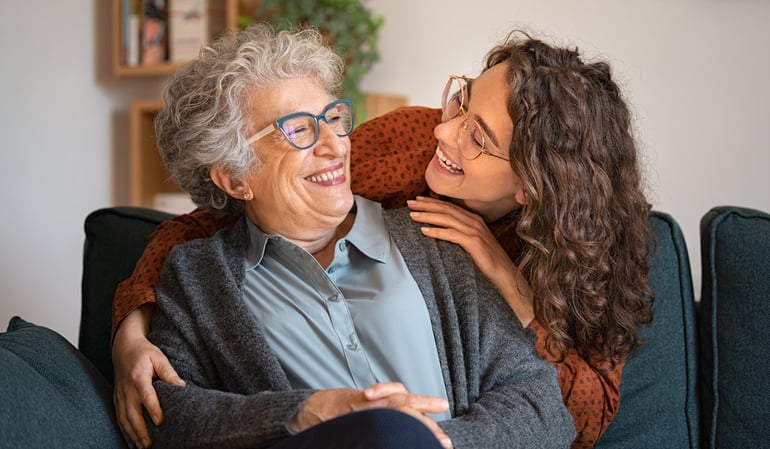
Lots of patience and empathy can help tremendously when you’re dealing with a loved one or someone else who is living with Alzheimer’s disease or dementia.
Here are some tips that can help reduce stress for caregivers and their loved ones. These pointers should ease some of the tensions that can arise by helping you understand why the brains of people with these disorders make them do some things they do. Some of these tips may seem intuitive, but others go against what many of us are inclined to do.
We have other blogs and materials that offer briefer lists of suggestions for communicating with people living with forms of dementia, but this is a deeper dive aimed at helping new caregivers and others to understand better what’s happening in the minds of those with dementia. These tips are based on recommendations from Shannon Braun, director of ERS’ Center for Memory Support and Inclusion, the Alzheimer’s Association, and others.
Some very important things to do
Allow the person to be correct, even if they’re wrong. A key thing to remember about someone who has dementia is they’re doing the best they can. Keep reminding yourself of this, which can significantly lower your stress level. Alzheimer’s Disease and dementia can be frightening, disorienting, and embarrassing for those living with those conditions, and obviously, it is very confusing for them at times. If there are difficult moments, such as your loved one insisting something is true when it’s not, let it go. Join their reality, and you may find there are opportunities to learn about what their life was like when they were younger. Remember: They are not doing what they do to make your life more difficult. And there’s an obvious exception to allowing them to be correct: If they believe they should do something unsafe, that’s not good.
Go with the flow. Avoid the temptation to correct a person with memory issues, as you might with people who don’t have dementia. If they are wondering where their parents are, as people with dementia often do, even when their mother and father passed away decades ago, it’s not necessary to remind them about the deaths, for one thing, that can again trigger a mourning process, as they unnecessarily relive that loss. Instead, a gentler strategy is to divert their attention and allow yourself to learn about their life. Join their reality, and ask them to tell you about their parents. Where do they work? What’s their house like? What are they like to be around? Your loved one’s memories can be a gift to you and can help them relive the fun times they had. One strategy is using “the 3Rs: Right, Reassure, and Redirect.”
Another is the use of Improv — similar to those quick-thinking comedy routines that actors use — in which we agree with an unusual scenario the other person puts forward, and then we add to it. A helpful way to think of how to roll with the flow in Improv is to think, or actually answer, with the words, "Yes, and..." in which we affirm the person's reality and then add to it, often redirecting them, as we do with the 3Rs.
Watch these 3 video stories to learn more about Improv
Here are three videos that give examples of using Improv that DD Farmer, Household Coordinator at the Deupree Cottages at Deupree House, recently shared with Braun:
First example of using Improv.
Second Improv example.
Third Improv example.
Avoid arguing. When the person says something you disagree with or you know is false, how critical is it that the person embrace the truth, especially when they very well may forget it again in a short time? Of course, if they believe something that’s unsafe for them, that’s one thing. But for the most part, it’s best to let it go or talk about something else. Remember: They’re not disagreeing with you to be difficult. They’re telling you what their mind is telling them to believe. They’re doing the best they can. It may help you both if you can focus on their feelings rather than the specific facts they’re telling you.
Empathize with their frustration. People with memory issues often have trouble communicating. They may have difficulty finding the right words or easily lose their thought. They may not be able to organize their words in a logical sequence. They even may use curse words. Because of these factors or others, they may speak less often. Think about how frustrating it is when you have trouble grasping for the right word, and imagine having that as a near-constant way of life. Their frustration can boil over toward themselves or you. It’s important to remember: They’re doing the best they can.
Quick communication tips
Here are more ways you can help someone with dementia:
- Show patience and understanding, remembering they may struggle to find the right words. Assign yourself the responsibility of being an especially good listener.
- Greet the person by their name. It helps get their attention and is courteous.
- Even if you have a longtime relationship with a loved one or friend, it can help to say your name and remind them who you are. People with dementia or Alzheimer’s often avoid socializing because they’re embarrassed that they can’t remember people’s names.
- Keep eye contact with them so they see you’re interested and care about what they say. That goes a long way.
- Use short sentences, not complicated ones. It helps to get down to their eye level so they can see your face and lips and hear you better.
- Pay particular attention to your body language because it can send negative messages. Also, use friendly facial expressions.
- Avoid asking questions such as, “Don’t you know who I am?” or saying things like, “I’m surprised you don’t know who that is.”
- Ask one question at a time.
- Don’t interrupt. Instead, give them some time to find the word they’re struggling to find.
- While you shouldn’t be quick to jump in and guess what they’re saying, it may be good to try to help them out if they’re having too much trouble.
- It helps them to be in a quiet place, free from interruptions, so that they can concentrate on conversations.
- Speak slowly and clearly with them. Be aware of how quickly you’re speaking.
- When giving instructions, break them into single steps, one at a time. Remember, they’re doing the best they can, so do the best you can to be patient.
- Use specific words to help them understand what you’re talking about. Rather than saying, “Here they are,” say: “Here your shoes are.”
- People with memory issues can be wary of entering uncertain situations in the outside world instead of staying in the comfort of their homes. So rather than asking if they’d like to take a walk – to which they’d probably say no – make it less likely they’ll refuse by saying, “It’s time for our walk.” “Now’s a good time for that walk your doctor says we should take….”
- Write things down as reminders. This can help when verbal instructions confuse them.
Other helpful suggestions
People with dementia often are embarrassed about forgetting names. That and other factors make it more difficult to engage socially, but it is important to do so – for both those with the disorder and those who care for them.
Braun strongly recommends participating in support groups and other dementia-friendly activities as one way to avoid embarrassment because people in those groups understand what is happening.
She notes recent studies have linked loneliness and social isolation in older people with a 49-to-60-percent greater likelihood of a future diagnosis than those who don’t feel lonely or isolated.
More help for caregivers, or families, of people with dementia, can be found at theERScenter.org.
Also, here are lists of resources that can help you if you’re in Greater Cincinnati/Northern Kentucky or in the Louisville, Ky. Area.
Do you need memory care tips? Read our blog or download our Dementia Guide.












